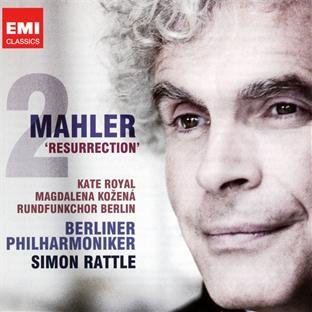Mahler Symphony No 2, 'Resurrection'
Beauty of sound comes alive in the hands of the Berlin Philharmonic
View record and artist detailsRecord and Artist Details
Composer or Director: Gustav Mahler
Genre:
Orchestral
Label: EMI Classics
Magazine Review Date: 3/2011
Media Format: CD or Download
Media Runtime: 0
Mastering:
Stereo
DDD
Catalogue Number: 647363-2

Tracks:
| Composition | Artist Credit |
|---|---|
| Symphony No. 2, 'Resurrection' |
Gustav Mahler, Composer
Berlin Philharmonic Orchestra Berlin Radio Chorus Gustav Mahler, Composer Kate Royal, Soprano Magdalena Kozená, Mezzo soprano Simon Rattle, Conductor |
Author: Edward Seckerson
With the first appearance of the second subject the Berliners’ famed sostenuto comes into its own, with Rattle’s pronounced rubato perhaps over-accentuating the keening harmony – but the theme’s return, shyly emerging from the mists of time, is very beautiful, with voluptuous cor anglais again pointing to the BPO’s exceptional pedigree. But this is an orchestra so reluctant to make an ugly sound that perhaps what I miss most of all at the dramatic extremes of this movement is the coruscating effect of shrill, demented woodwinds and the brassy penetration of trumpets and trombones. Time and again the tutti sound strikes me as too blended.
The pacing, too, feels overly expansive despite Rattle’s meticulous adherence to Mahler’s frequent and often extreme tempo fluctuations. Certainly we’ve come a long way from Otto Klemperer’s celebrated EMI studio recording in which he systematically disregarded all such indications as if he were still conducting Todtenfeier, the first incarnation of the movement where none of these markings exist. One might include in that assessment the unmarked but traditional ritardando into the battering dissonance at the climax of the development. Rattle makes a meal of that. But surely it’s more shocking not to signal the arrival of the molto pesante? Isn’t that the reason Mahler pointedly avoided suggesting any slackening of pace in the moments before this shattering derailment?
The life-in-retrospect inner movements bring playing of exquisite tone and quick reflexes, with Rattle making much of the headlong panic which snaps us out of rosy reverie in the second movement. Again, in the Trio of the third movement, the trumpets are too blended for my taste, the “barbershop” harmony not cheesy enough to convey that old rustic charm. And when the quirky little ditty goes cosmic at the climax I just wanted more definition of trumpets and horns spinning the movement off its axis.
Magdalena KoΩená brings her customary depth of feeling to the still maternal voice of “Urlicht” (though one or two switches of register evidence some discomfort); and notwithstanding moments where I would like the veneer stripped off the brass (especially the first trumpet), the finale – with magical spatial effects – is magnificent. Rattle’s famous piano-pianissimos are deployed to breathtaking effect, the choral passages (radiantly illuminated at the top by Kate Royal) sound pure, mysterious and very Bachian, and the returning resurrection hymn is tremendous.
There is still no completely ideal recording of this inspiring piece: if we could somehow conjure an amalgam of Rattle, Fischer, Bernstein and Tennstedt we’d be getting close. I personally am drawn back to Iván Fischer, while the recent live Tennstedt lays bare the whole burning issue of mortality with uncompromising force. If he is the Beast, then Rattle is undoubtedly Beauty. If only we could bring them together.
Explore the world’s largest classical music catalogue on Apple Music Classical.
Included with an Apple Music subscription. Download now.

Gramophone Digital Club
- Digital Edition
- Digital Archive
- Reviews Database
- Events & Offers
From £9.20 / month
Subscribe
Gramophone Club
- Print Edition
- Digital Edition
- Digital Archive
- Reviews Database
- Events & Offers
From £11.45 / month
Subscribe
If you are a library, university or other organisation that would be interested in an institutional subscription to Gramophone please click here for further information.






